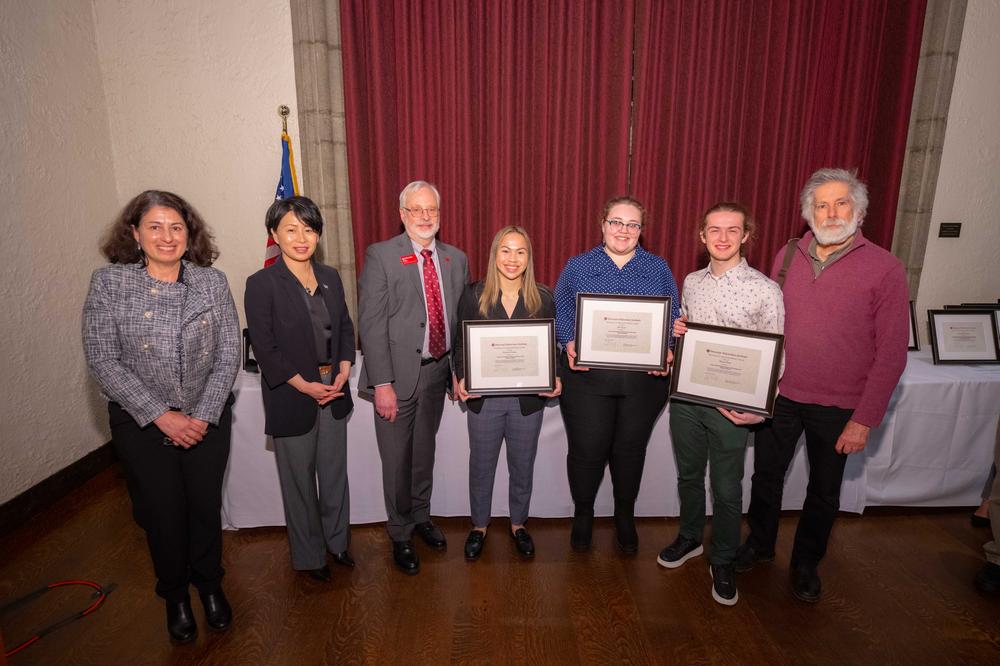• Many of us have a certain image of Nantucket (as it has been beatifically portrayed in many a movie and the affable 90s sitcom “Wings”): Independently wealthy; a haven for seekers of a simpler life; quaint artisan shops, yachts and fishing boats bobbing just off its shores.
While there’s no doubt the small island just 30 miles off of Cape Cod is stunningly beautiful, thrumming with tourism, and a desirable attraction for the well-to-do, it isn’t without its socio-economic issues.

IQP team members Nhi Phan, Elizabeth
Beazley, and Taylor York.
In fact, because housing prices on Nantucket are six times the median on the nearby mainland, about half the people who call it their full-time home struggle to afford housing.
“It’s a major problem for the island,” says Dominic Golding, associate teaching professor and director of the Nantucket Project Center. “There’s a major shortage of housing, and the housing that is available is extremely expensive.”
But with some help from WPI, it’s a challenge the island is (at least a little bit) more equipped to tackle.
Based on extensive research by an IQP team, Housing Nantucket, an island nonprofit, has been able to secure certification as a Community Development Corporation (CDC). That ultimately opens it up to receive support from the state Community Investment Tax Credit (CITC) program; it is now able to offer $150,000 in state tax credits to financial backers, provided it can fundraise at least $300,000 a year.
Essentially, as Golding explained, it’s a “carrot” to potential donors.
Any money raised through the CITC program will go directly toward building and maintaining affordable rental units on the island.
Housing Nantucket, which has been around since 1994, serves year-round residents who earn between 50 and 150 percent of the Area Median Income. According to the agency, homeownership is “prohibitive” to about 90 percent of year-round residents.
As Golding explained, it has a significant impact on the island’s economy: Although 10,000 to 12,000 people live there throughout the year, that swells to about 60,000 in the summer with the influx of tourists and part-time residents. That increase equals more available jobs--but few affordable (or available) places for workers to live.
“Every person I talked to during my trip to Nantucket agreed that housing has been, and still is, a very important topic that needs to be addressed and soon,” says Nhi Phan ’17, a biomedical engineering major who worked on the project. “I’m looking forward to seeing how Housing Nantucket is going to push forward in the coming years and how this project has helped them do so.”
Over a 14-week period last year, Phan and two fellow students spent time on and off the island researching its housing situation as part of their IQP. That process involved learning about the CDC certification process, querying locals and community leaders, and interviewing other Massachusetts CDCs about their roles in their own communities, their outreach efforts, and their operations. The project culminated with an assessment of Housing Nantucket’s services and community involvement, along with an outline on how to apply for CITCs, as well as proposed recommendations to help secure CDC status.
“What surprised me most was learning that housing is truly prohibitive to the majority of Nantucket residents,” says Elizabeth Beasley ’17, an actuarial mathematics major who also worked on the project. “Housing prices on Nantucket are extremely high, as one might expect, but there isn’t a range of low cost alternatives. So the work that Housing Nantucket does to provide affordable housing options is vitally important.”
Ultimately, the project was beneficial not just for the residents, but for her and her fellow students--specifically by illustrating how great an impact an IQP can have on a community.
“I’m glad that I had this opportunity to learn not only how to coordinate as a team, but also to contribute to something much bigger than just one term project,” she says, noting the exposure to real-word problems that can be tackled with theory, practice and “great team work. I’ll carry these lessons with me as I start my career, and remember that the work I do will impact not just a community, but real people.”
- By Taryn Plumb



